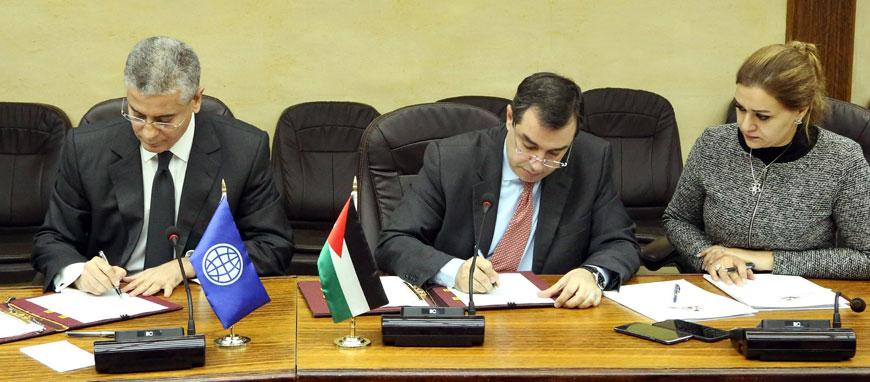You are here
World Bank to provide Jordan with 1.9b over two years to support reforms
By Mohammad Ghazal - Mar 03,2019 - Last updated at Mar 03,2019

His Majesty King Abdullah meets with World Bank Group Interim President Kristalina Georgieva in London on Thursday (Photo courtesy of Royal Court)
LONDON — The World Bank will provide $1.9 billion in financial support to Jordan over the next two years, almost as much as it has provided to the country over the last five years, citing its commitment to the Kingdom and the “strong” reform momentum in the country, according to Kristalina Georgieva, interim president of the World Bank Group and chief executive officer of the World Bank.
“We have been a partner for a long-long, time… And I can genuinely say that reform momentum in the county is strong and the partners of Jordan recognise that… Our commitment to Jordan on the basis of the strong reform is to do over the next two years almost as much as we have done in the last five years in financial support for Jordan,” Georgieva said in an exclusive interview with The Jordan Times during the London initiative, which was hosted by the UK on Thursday to drum up international support for Jordan.
The financing is subject to the approval of the board of director and the reforms steadily moving forward, she said.
“We are aiming at $1.9 billion over two years…. These loans include some highly concessional ones… we are also mobilising our global concessional financing facilities to help mostly Lebanon and Jordan to deal with the pressure from Syrian refugees,” she said.
On the breakdown of the $1.9 billion financial support, Georgieva said: “We have very advanced preparation of development policy loan for Jordan that would be in the border of $1 billion in addition to two loan guarantees; one from Saudi Arabia of $200 million and another from the UK of $250 million.”
Of the remaining amount, there is a $100 million loan, a highly concessional one that is “close to a grant”.
The remaining sum also includes a project finance for which discussions are under way with Jordan to determine the targeted areas.
“The financing is well below of what Jordan will be borrowing from international market… it includes highly concessional, close to grants, financing from international government associations and grant financing from partners” of the World Bank, she said.
“We are already advancing in this regard and it will come in instalment but in a very predictable manner…. Jordan can rely on the World Bank,” she added.
On recent fiscal reforms, Georgieva said: “It is critical to demonstrate a discipline in the way Jordan manages its finances to have the credibility to demand the full support of its partners... It has not been easy. It is painful when that strong fiscal consolidation takes place. But it boosts the credibility of the country and the material outcome.”
The World Bank, she added, is also working very hard through its private sector arms such as the International Finance Corporation as well as its Multilateral Investment Guarantee Agency to be more present in Jordan.
“We are aiming over these two years to create a pipeline of projects in Jordan [worth] $1 billion... We want to see a boost not only to the public sector but also to the private sector,” she added.
Georgieva noted that the World Bank works with Jordan on targeting social protection for the most vulnerable segments of the population.
“We have worked with Jordan to modernise the National Aid Fund and digitise payments,” she announced, explaining that digital payments are not only very reliable and go to the right beneficiary, but they can also overhaul the financial system, rendering it more vibrant financial and conducive financial inclusion, she added. “We are also very committed to supporting Jordan in protecting the people who were affected more dramatically by reforms,” she added.
The World Bank is working with Jordan on the reform matrix making sure that it is implemented but also making sure that the Kingdom can tap into technical capacities in areas that are more complicated and require more efforts.
The UK was the first country to support this technical capacity with a grant to build the expertise necessary for Jordan to stay on track, she added.
“Our role in Jordan is to also provide evidence to those who might not know enough about Jordan so when Jordan makes improvement in the investment climate we are amplifier for the investment community of what has been achieved,” Georgieva said.
“We are the institution that everybody trusts, we are tough, demanding but we are also fair,” the interim director concluded.
Related Articles
AMMAN — Jordan and the World Bank will start discussions next week over a $1-billion concessional loan to the Kingdom to support fiscal refo
AMMAN — Jordan is expected to receive next month $950 million out of a $1.4 billion loan from the World Bank, a government source said on Mo
AMMAN — Jordan on Sunday signed a $250 million soft loan with the World Bank to enhance reforms in the energy and water sectors.The loan's p

















